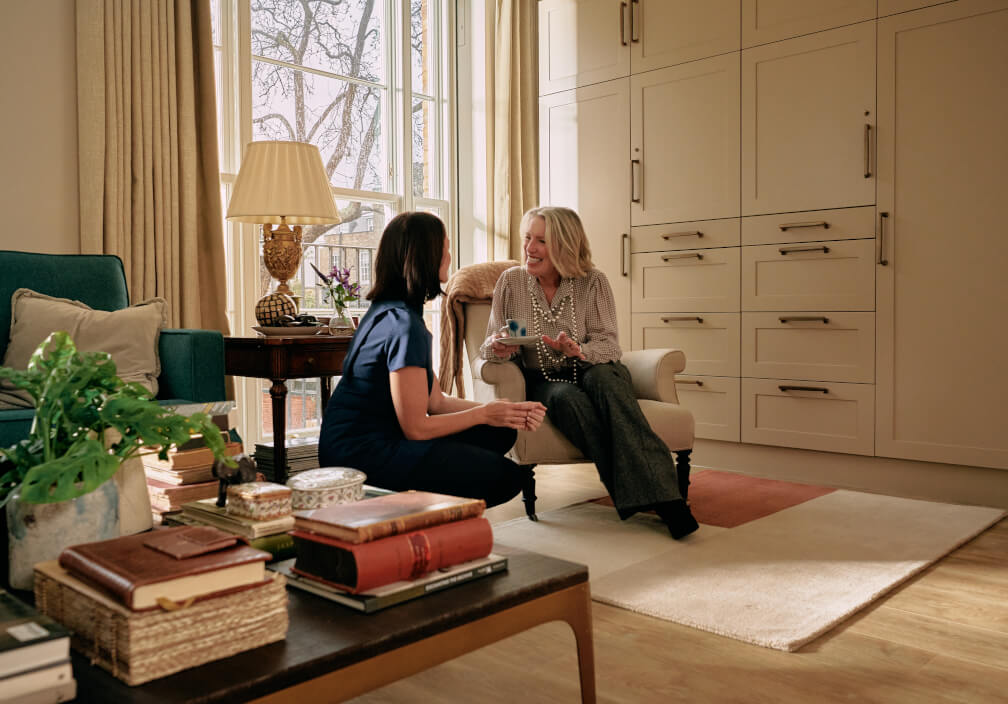Caring for a loved one living with dementia often involves navigating a complex array of behaviours that can be distressing and difficult to manage. Understanding how to manage behaviour in dementia is essential to provide safe and effective care that respects those living with cognitive decline. At Loveday, we recognise that distress responses such as aggression, confusion and agitation often arise from unmet needs, frustration or changes within the brain. Our approach blends expert knowledge, empathy and tailored care techniques to support both Members and their families through these challenges.
Understanding How to Manage Behaviour in Dementia
Dementia behavioural changes can manifest in many ways, including sudden mood swings, irritability, restlessness and verbal or physical aggression. While these behaviours can be upsetting, it is important to remember that they are symptoms of the disease, not intentional acts aimed at you.
De-escalation Techniques Dementia
- Remain calm and composed: Responding with patience helps reduce escalation.
- Use clear, simple language: Avoid confusion by speaking slowly and gently.
- Maintain a safe environment: Remove hazards and ensure supervision where needed.
- Establish structured routines: Predictability can reduce anxiety and agitation.
- Provide meaningful activities: Engage the person to prevent boredom and restlessness.
- Identify triggers: Monitor what causes distress and minimise those factors.
- Offer reassurance: Use non-verbal cues such as touch or a gentle tone.
- Encourage hydration and nutrition: Physical discomfort can worsen behaviour.
- Seek professional support: Involve healthcare professionals when behaviours escalate.
Safe Dementia Care Techniques
Implementing safe dementia care techniques is crucial when dealing with distress responses . A calm and reassuring presence can help de-escalate tense situations. One of the most effective approaches is to prioritise safety- both for the person living with dementia and for carers. This includes creating an environment free from sharp objects, obstacles or anything that may provoke frustration or accidents.
Structured routines for dementia offer predictability that comforts the person and reduces confusion. Regular mealtimes, set periods for rest and familiar activities can all help reduce agitation and improve cooperation. Consistency in carers and surroundings further strengthens a sense of security.
Managing Aggression in Dementia
Aggression is a distressing behaviour that can stem from fear, pain or difficulty expressing needs. To manage aggression in dementia, it is vital to understand the cause. Physical discomfort, medication side effects or environmental stressors often play a role. Strategies include:
- Maintaining a calm voice and body language
- Avoiding confrontation or arguing
- Using distraction techniques like changing the subject or introducing a favourite activity
- Removing the person from overstimulating environments
- Providing space and time to calm down
If aggression persists or worsens, consulting medical professionals for tailored interventions is important.
Sundowning Syndrome UK
A phenomenon commonly observed in dementia is sundowning syndrome, where symptoms such as confusion, agitation and irritability worsen in the late afternoon or evening. The reasons are not fully understood but may relate to fatigue, low light or disruption of the body’s internal clock.
To support someone experiencing sundowning, carers can:
- Ensure ample natural light during the day
- Maintain quiet and calm in the evening
- Encourage calming routines before bedtime such as gentle music or a warm bath
- Avoid caffeine and heavy meals late in the day
- Use night lights to reduce disorientation
De-escalation Techniques – Dementia
When behaviours escalate, knowing de-escalation techniques for dementia can prevent harm and ease tension. Some effective methods include:
- Speaking softly and reassuringly
- Offering choices to restore a sense of control
- Using distraction through music, photos or sensory objects
- Validating feelings rather than challenging delusions
- Maintaining a non-threatening physical stance
- Practising deep breathing or slow movements yourself to model calm
Carers should be trained in these techniques to feel confident and prepared.
Hallucinations in Elderly Individuals
Hallucinations in elderly individuals living with dementia can be distressing both for the person experiencing them and for their carers. These sensory perceptions, most commonly visual or auditory, are often linked to changes in the brain caused by dementia.
To support someone experiencing hallucinations, consider the following approaches:
- Gently validate their experience without challenging whether the hallucination is real, offering reassurance instead.
- Use simple, calming phrases such as, “That sounds frightening, but I am here with you.”
- Reduce environmental triggers by minimising harsh lighting, loud noises or other sensory stimuli that might provoke hallucinations.
- Ensure safety by removing any objects that could cause harm if the person reacts unexpectedly.
- Consult healthcare professionals if hallucinations occur frequently or cause significant distress, as medical review and possible medication adjustments may be necessary.
Exit Seeking – Dementia Prevention
One of the most concerning behaviours is exit seeking, where people living with dementia may wander off due to confusion, anxiety or a desire to ‘go home.’ This behaviour poses significant safety risks.
Preventive measures include:
- Creating a secure but non-restrictive environment which may include locked doors or alarms.
- Providing clear signage and familiar cues to orient the person.
- Offering meaningful activities to reduce restlessness.
- Encouraging regular exercise to channel energy positively.
- Keeping a routine to reduce anxiety triggers.
- Informing neighbours or local authorities as part of a safety plan.
- Complete the Herbert Protocol and keep this updated
Using GPS tracking devices can also offer peace of mind without compromising independence.
Dementia Agitation Solutions
A combination of environmental modifications, communication techniques and emotional support can be effective dementia agitation solutions. Agitation can arise from pain, discomfort, boredom or even overstimulation. Effective solutions include:
- Maintaining a calm and reassuring tone.
- Reducing noise, clutter and distractions.
- Providing familiar objects and activities.
- Offering opportunities for gentle physical activity like walking or stretching.
- Using aromatherapy or soothing music.
- Monitoring for pain or medical issues.
Each person’s triggers and preferences are unique, so personalised care plans are essential. Our expert team at Loveday are highly experienced in recognising triggers and adapting the environment to address dementia agitation.
Caregiver Stress Management
Supporting someone living with dementia can be demanding, making caregiver stress management a critical component of successful care. Carers need to prioritise their own wellbeing to maintain patience and resilience.
Helpful strategies for carers include:
- Seeking respite care to take regular breaks.
- Joining support groups to share experiences.
- Accessing professional counselling or advice.
- Practising mindfulness or relaxation techniques.
- Setting realistic expectations and accepting help.
- Maintaining social connections and hobbies outside of caregiving.
At Loveday, we recognise that caring for carers is an integral part of dementia care. Our teams provide guidance and support for families every step of the way, so you know that you are never alone.
Managing distress response requires patience, understanding and a flexible approach grounded in compassion. By implementing safe dementia care techniques, creating structured routines for dementia and employing effective de-escalation techniques, carers can reduce distress for their loved ones and themselves.
Awareness of issues like sundowning syndrome, hallucinations in elderly and strategies for exit seeking dementia prevention are essential to creating a safe and supportive environment. At Loveday, our bespoke dementia programmes focus on holistic wellbeing, equipping families with tools to navigate behavioural changes while upholding respect.
If you would like to explore how our expert team can support you or a loved one living with dementia, please do not hesitate to get in touch.




